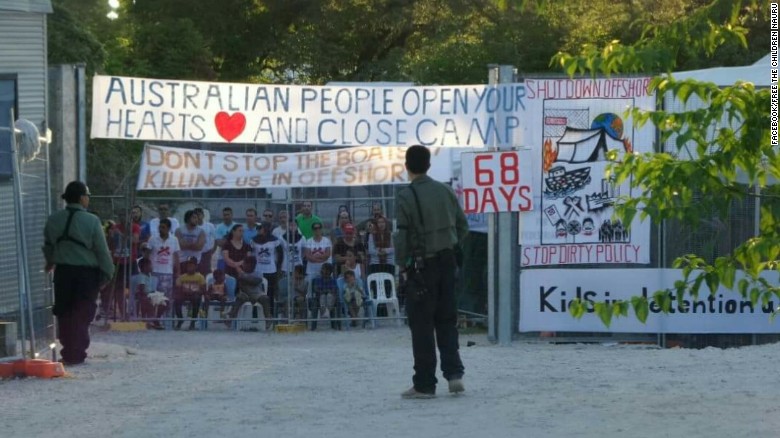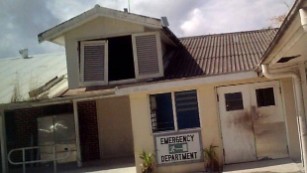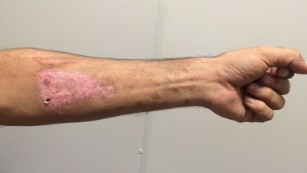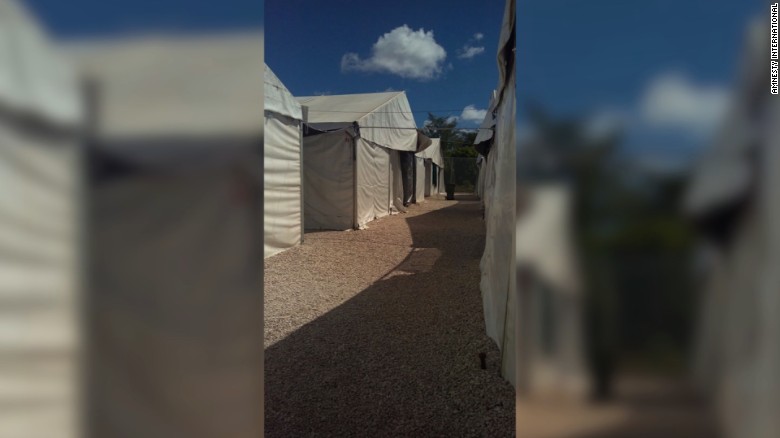
Australia is deliberately abusing refugees in an offshore detention camp to try to stop people seeking asylum in their country by boat, human rights groups claim in a new report.
Daily violence, suicide attempts and children left without medical treatment were among some of the allegations documented by Amnesty International and Human Rights Watch during a visit to Australia’s detention center on the remote Pacific Island of Nauru in July.
Human Rights Watch Children’s Rights Division senior counsel Michael Bochenek was one of two researchers who visited the island with a legal visa, but without notifying authorities directly of his intent or who he worked for.
“In my experience there is no other developed country that I can think of who has pursued this course of conduct with people who are fleeing persecution, who are seeking freedom, who are accused of no crime,” Bochenek told CNN.
“There is no parallel for this.”
The rights groups said the Australian government was well aware of the issues on Nauru and appeared to be using them to deter other potential asylum seekers.
However, Australian officials said they had not been contacted about the allegations and strongly denied “many” of them.
“We would strongly encourage Amnesty International to contact the Department before airing allegations of this kind. The Department strongly refutes many of the allegations in the report,” said an Australian Department of Immigration and Border Protection spokesman. He didn’t specify which ones.
‘I am in constant pain’
In their interviews with refugees kept indefinitely on the island, released in a report on Wednesday, Amnesty and Human Rights Watch documented tales of fear, anger and despair.
“People here don’t have a real life. We are just surviving. We are dead souls in living bodies,” one man told researchers. “We are just husks. We don’t have any hope or motivation.”

During his visit to the island, Bochenek said refugees told him they experienced regular harassment from locals, poor medical treatment and often discussed killing themselves, including children as young as 10.
“What’s going through the mind of a 10-year-old who is thinking about killing herself?” Bochenek said.
More than 20 refugees interviewed by the researchers said they had been robbed or assaulted by Nauruans, including one man who was hit on the head with a machete.
One woman who has chronic illness which caused her to develop lumps in her breasts, throat and uterus said she could never complete treatment at a offshore hospital before she was forced back to Nauru.
“When I was in Australia, my doctor told immigration that I needed surgery for my breasts, but they still sent me back. My problems deteriorated… they gave me some pills, but they are not working, and I am in constant pain and cannot eat anything,” a woman told the not-for-profit workers.

Researchers were told children in Nauru suffered from serious mental health problems such as bed wetting or even completing stopping communication, while most faced regular bullying at school.
Some young asylum seekers told Amnesty International and Humans Rights Watch that they had stopped going to school as a result.
Australia’s asylum seeker legacy
Since 2012, refugees arriving in Australia by boat have been transferred to offshore centers in small pacific nations such as Nauru and Papua New Guinea’s Manus Island, to make it clear they would not be settling in Australia.
Successive Australian leaders have defended the policy as humanitarian, to stop people drowning at sea, despite multiple reports of abuses at the country’s offshore camps.
Between 2007 and 2013, the Australian government says at least 1,200 people lost their lives trying to make the journey over water.
In February, the Australian High Court upheld the government’s right to hold the asylum seekers.
As of the end of June, Australia government records say that 442 people were in detention on Nauru, including a number of children, from Iran, Afghanistan, Iraq and Syria, among other places.
The Nauru government operates the detention center with support from Australia and private contractors.
In 2014, Iranian asylum seeker Reza Berati was beaten to death during a protest on Manus Island while in 2016, a man and a woman died in seperate incidents after setting themselves on fire at the detention center on Nauru.

In January 2016, CNN spoke to former and current child detainees at the Nauru camp, who said it was “the worst place [they’d] ever seen for children.”
Speaking to CNN, Australian director of Human Rights Watch Elaine Pearson said the country’s policy towards refugees had been a “horrible human experiment.”
“It seems to be a very deliberate policy to maintain a certain level of cruelty… I can’t think of many other countries who would go to such lengths to inflict this level of suffering on people,” she said.
Broadspectrum, who are the private company responsible for many aspects of refugees’ care on Nauru, not including medical, said through a spokesman they had also been unaware of the report until Monday.
“[We] were not given a genuine opportunity to respond to the various unsubstantiated assertions and allegations before the report was published,” he said.
The Australian and Nauru governments make it very difficult for journalists to see the detention center firsthand.
The Nauru government charges media an A$8,000 dollar (around US$5,800) nonrefundable visa fee per application.
The Australian Immigration department requires journalists who wish to apply to visit Australian detention centers to first sign a form saying they will not interview any detainees, and that they will submit all their content to the government for screening.
They forbid pictures, video and audio records of detainees. The government says this is in order to protect their privacy.
Nauru’s government has been contacted for comment.
As reported by CNN
